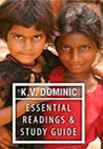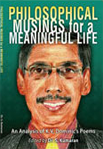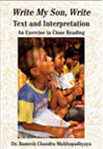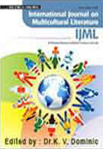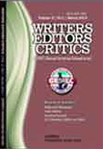Books Review in Detail
Review Of A Comparative Study of Two Contemporary English Poets: O. P. Arora and K. V. Dominic by Prof. NP Singh
Prof. N P Singh’s Review of KV Dominic’s Write Son, Write and OP Arora’s Pebbles on the Shore
A Comparative Study of Two Contemporary English Poets: O. P. Arora and K. V. Dominic
Â
N. P. Singh
Â
Pebbles on the Shore by O. P. Arora (2011) and Write Son, Write by K. V. Dominic (2011) are two collections by poets who have gained prominence in the first decade of the post-millennium era. Both of them are retired academicians but they are fully committed to the land of their birth. They are compassionate as well as angry at the degradation of men, women and children in a changing world under the impact of globalization. They are not neutral in the struggle between the privileged and the underprivileged. They are poets who are crusaders as well. They write poetry that is a critique of the present, the status quo and by implications they also give us glimpses of a world that is shaping slowly and slowly. Dystopia and utopia both exist in their poetry. The future seems to point towards a world based on equality, fair play and justice–a world in which harmony and peace would eventually prevail.
The poems that stand out in Pebbles on the Shore are: “I Don’t Eat the Dead,†“The Sunset,†“Copenhagen,†“Who Cares?†“Ravana,†“Guernica,†“When I Reached the Corner†and “Three Babes.†While “I Don’t Eat the Dead†examines the physical lethargy of the man of our time, “The Sunset†lays stress on the sunset all over the world. The protagonist in the poem describes sunset in these words:
Nature’s marvel, heart’s pleasure
feast for the eyes, camera’s treasure. (24)
While “Copenhagen†celebrates the idea man, full of immense possibilities, and juxtaposes him against the man of our time, a predator destroying both flora and fauna upon the earth, “Who Cares†warns against the man of our time who is all set to destroy the ecology ofAntarctica. The protagonist in “Who Cares†is convinced:
Man is no friend, a fiend stalks
He has devoured the beautiful earth
How his greedy eyes turn to our hearth… (38)
While “Ravana†depicts that Ravana is loved more than Rama in the contemporary age, “Guernicaâ€Â shows how butchers turn the entire world into a slaughter house. “When I Reached the Corner†portrays man’s fearful journey in a dark, dismal world:
When I reached the corner
there was no light there… (59)
“Three Babes†is a most dramatic poem that depicts the different destinies of three infants born the same time, the same day in a hospital ward. While one of them is destined to become the M.D. of a big business firm, the other one is destined to become a wage-earner. While the first one has all the advantages of birth, the second one has all the advantages of “playing in the gutter†(62). The third one, belonging to the middle class, has the dream to reach the top but he never reaches it. His plight is visualized thus:
eyes on the Zenith, never reaching it,
yet the hope… (63)
“Three Babes†is a graphic portrayal of the rigid stratification of contemporary social order that negates justice and equality. It is a kind of dystopia that prevents the full growth of human potential. The protagonist in the poem puts question that is hard to answer:
Is it destiny
divine order
karma chakra
or man’s cruelest joke? (63)
The poems that stand out in K. V. Dominic’s Write Son, Write are: “Write My Son, Write,†“An Elegy on My Ma,†“Massacre of Cats,†“A Cow on the Lane,†“God is Helpless,†“Rocketing Growth of India,†Teresa’s Tears,†“Water, Water Everywhere†and “Wolfgang, the Messiah of Nature.†It is the personal element that is important both in “Write My Son, Write†and “An Elegy on My Ma.†In the former, the longest poem in the collection, both the harmony of nature and the lack of harmony of man’s civilization have been sharply juxtaposed. The protagonist of the poem has visualized the dilemma of the contemporary world in these words:
I breathed in him
celestial values:
happiness, beauty,
peace, love, mercy;
but he fosters
hate and violence;
kills his kith and kin;
shows no mercy
to animals and plants. (28)
The protagonist of the poem also draws our attention to the political, intellectual and religious mafia that exploit and misguide the people suffering from ignorance, illiteracy and prejudices of all kinds. The long poem comes to an end with the following words:
If they heed
they will be saved;
other beings
will be saved;
plants will be saved
and the universe
as such will be saved. (37)
There is a kind of Biblical simplicity and directness in the prophecy that the protagonist makes at the end of the poem.
“An Elegy on My Ma†and “Massacre of Cats†are poems, beautiful poems, full of compassion and anguish. The protagonist in the first poem recalls the old age of his mom and also her suffering for six long years before death. He also wonders:
What would be our fate, ma,
when we become old as you? (41)
He also recalls her words to surrender to divine will and not to fret on morrow. The Protagonist of “Massacre of Cats†is deeply hurt at the poisoning of his four cats by his neighbours who are not only pious but also went to church every morning for prayer. The Protagonist also points out:
My materialist neighbours
go to church every day;
read the Bible every day;
but never read the part
to love other beings
as fellow beings. (45-46)
It is suggested by the protagonist of the poem that even those who read the Bible every day are grossly materialistic and completely alien to the spirit of the holy scripture. He, however, has a hope that the neighbours are not beyond hope:
Let my neighbours expiate,
dig out skeletons
of my cats;
tie them
to their necks
as Coleridge’s
ancient mariner
did a century back
since he killed
the ominous albatross. (46)
The poem is full of compassion and human concern and even the materialistic neighbours are not beyond redemption. While O. P. Arora seems to imply that the man of our time is beyond redemption, K. V. Dominic has a hope that his materialistic neighbour may be redeemed through repentance and expiation. He may not go to church everyday like his neighbours but he is deeply imbued with the spirit of Christ. He has a hope in the redemption of the man of our time. “Cow on the Lane†is a short and dramatic poem that affirms a cow’s right on the lane. The protagonist has to reach the station in time to catch the train. The cow, occupying the lane, retorts cheerfully, “Don’t disturb my slumber†(47). It is an awkward situation for the protagonist but he does not lose his cool. He also shows respect for the cow’s need for space in a cramped world. It is delightful poem indeed.
“God is Helpless†is a dialogic poem in which man’s complaint against global warming and God’s reply showing his helplessness to save the planet have been dramatically juxtaposed. There are two voices in the poem, the voice of man and the voice of God.
Dystopia seems to be prominent both in “Rocketeing Growth of India†and “Teresa’s Tears.†While the former shows a big gulf between India of glowing statistics and fast economic misery of the huge masses of Bharata, the latter shows the inhuman exploitation of a poor, part-time sweeper in a primary school in the state of Kerala. The element of satire is most trenchant in both these poems, something that reminds one of Jonathan swift.
“Water, Water Everywhere†and “Wolfgang, the Messiah of Nature†are two companion poems in the collections. While there is a brilliant picture of dystopia in the former,
Water rationed,
per day quota
half a glass.
Kidney failure,
a major cause of mortality.
Water stolen
at gun point;
armed forces guarded
water reservoir of nations. (92)
the latter contains a vivid portrayal of utopia. Wolfgang is a messiah of nature. He flew fromBerlinto Kerala at the age of twenty. In forty years, he has created a dense forest full of:
Twenty species of snakes,
fifteen species of amphibians,
two twenty species of birds,
sixty varieties of butterflies,
two thousand kinds of plants. (93)
Towards the end, the protagonist in the poem affirms:
He has realized the truth,
the truth of eternal relations
between God, Man and Nature. (94)
The harmony that has been suggested in “Write My Son, Write†has been fully realized in “Wolfgang, the Messiah of Nature.â€
All in all, both O. P. Arora and K. V. Dominic have enriched contemporary Indian English poetry through their latest collections which carry the stamp of their personality. While O. P. Arora’s imagination has a global sweep, encompassingCopenhagenand the penguins ofAntarctica, the imagination of K. V. Dominic is, largely rooted in the flora, fauna and the soil of Kerala. While O. P. Arora does not have much hope from the man of our time–a predator–the man in K. V. Dominic’s poetry has a hope of redemption. He may be saved by the grace of God.
Â
Works Cited
Arora, O. P. Pebbles on the Shore. New Delhi: Sanburn Publishers, 2011. Print.
Dominic, K. V. Write Son, Write. New Delhi: Gnosis, 2011. Print.
Â
Â
Dr. N. P. Singh, retired professor of English, is a reputed English poet and critic from Janakpuri, New Delhi.
Â

